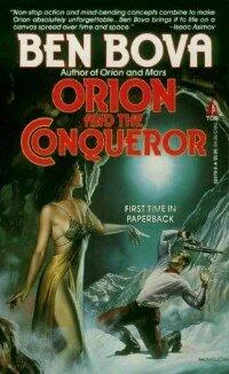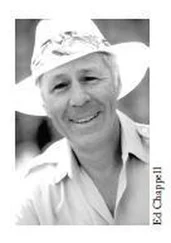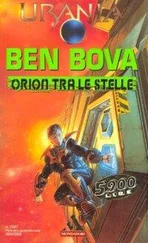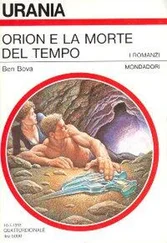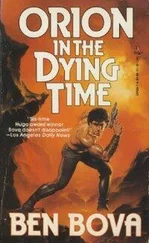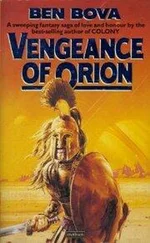I was sitting on a rocky hillside that descended to a heaving dark sea, where churning waves broke against the black boulders and sent up showers of spray. The salt tang of the sea reached me even up near the crest of the ridge where I sat, blinking away the memories of death, trying to adjust my mind to this new existence. There was a narrow crescent of sandy beach beyond the boulders, and then steep cliffs of bare rock. It was a gray day, yet not really chilly. The wind coming off the water was warm and wet, gusting fitfully. The trees up at the crest of the ridge sighed and rustled. I could see that the incessant sea breeze had bent and twisted them into hunched, lopsided forms like stunted arthritic old men.
I rose gingerly to my feet. I felt strong and alert. I knew I was a long way from Ararat, perhaps in a different era altogether. Then I realized that my clothing now consisted of a brief leather skirt and a leather vest so sweat-stained and cracked with age that it looked black. My dagger was still strapped to my thigh beneath the skirt. My feet were shod in rude sandals, bound to my ankles with leather thongs.
Where I was, and why I had been placed here, I did not know. I saw a trail threading through the rocks down the hillside to the narrow curving strip of white sand and an even narrower road that ran along the coastline. I headed for that road.
Then a new thought struck me. Who had sent me here? Hera, or Anya? Or one of the other Creators, perhaps—Aten, the Golden One?
By the time I reached the side of the road I felt like a blind man groping in unfamiliar territory, wondering which direction to take. To my right, the road followed the coast and then disappeared in a cut between two rocky cliffs. Far to my left, it swung inland from the beach and climbed up into the hills I had just come down from.
I decided to go to the right. The surf was rolling up peaceably enough on this narrow strip of sandy beach, but up ahead the waves smashed against the black rocks with thunderous roars. No one else was in sight, and as I walked along I wondered if Hera or the Golden One had sent me to a time before any human beings existed. But no, I reasoned: the road I followed was unpaved yet definitely the work of men, not an animal trail. I could see ruts in it worn by wheels.
As I walked along, the sun dipped below the dismal gray clouds, heading for the flat horizon of the even grayer sea. The road cut between the cliffs, then curved around another crescent-shaped beach. The coastline must be scalloped with these little beaches hugging the rugged hillsides, I thought. The sea was probably teeming with fish, but I had nothing with which to catch any. So when the sun touched the water’s edge, red and bloated, I hiked up into the woods at the crest of the hills to hunt for my dinner.
By the time it was fully dark I was sitting before a small fire, hardening the point of a rough-hewn spear in its flames, digesting a supper of field mouse and green figs.
I started out along the coast road again at sunrise, my makeshift spear on my shoulder. Before long I came upon a fork; one branch continued along the coast, the other cut inland, up into the hills. I started up the hill road, thinking that it must lead somewhere. Yet for most of the day I saw no one else at all. Strange, I thought. Long ages of use had pounded the road hard and almost smooth, except for the ruts worn into it from the wheels of carts and wagons. Still I saw no one at all until well past noon.
Then I saw why no one else was using the road. In the distance, crowning a steep hill off to one side of the road, a walled city sat beneath the hot high sun. And what looked like a small army was camped outside its wall. It reminded me of Troy, except that this city was inland and the besiegers were not camped among their boats on the shore.
For long moments I hesitated, but finally I decided to follow the road to that camp. There must be some purpose for my being here, I reasoned. Perhaps this little war was it.
The discipline at the camp was extraordinarily lax, even compared to the unhappy camp of Philip’s army before Perinthos. Men milled about, all of them armed but none of them in anything I could describe as a uniform. Most of them wore leather corselets. Their swords were bronze. They seemed to have no discipline at all.
Then a soldier in bronze breastplate spotted me. “You there! Stand fast! Who are you and what are you doing here?”
He was young enough so that his beard was nothing more than a few wisps. His shoulders were wide, though, and his eyes as black as onyx.
“I am a stranger in these parts,” I replied. “My name is Orion.”
A few of the other men-at-arms gathered around us, eyeing me casually. I had to admit that I was not much to look at.
“Where’d you get that spear?” one of them asked, grinning. “Hephaistos make it for you?”
Their accent was much different from the Macedonians. It was an older variant of the tongue.
“I can just see the Lame One forging that mighty weapon up on Olympos!”
They all broke into laughter.
“Zeus must be jealous of him!”
“Naw, he probably stole it from Zeus!”
I stood there like a bumpkin and let them slap their thighs and roar with laughter. The young officer, though, barely cracked a smile.
“You are not from these parts?” he asked me.
“No. I come from far away,” I said.
“Your name—you call yourself Orion?”
“Yes.”
“Who was your father?”
I had to think fast. “I don’t know. I have no memory of my childhood.”
“Doesn’t know who his father is.” One of the men nudged his nearest companion in the ribs.
“I am a warrior,” I said, realizing that there was no word for soldier in their dialect.
“A warrior, no less!” The men found that uproarious. Even the young officer smiled. Others were gathering around us, making something of a crowd.
I dropped my spear to the ground and pointed to the one who was making all the remarks. “A better fighter than you, windbag,” I challenged.
His laughter turned to a hard smile. He pulled the bronze sword from the scabbard at his hip and said, “Pray to whatever gods you worship, stranger. You’re about to die.”
I faced him empty-handed. Not a man offered me a weapon or made any objection. The windbag was an experienced fighter, I could see. His sword arm was scarred, his eyes focused hard on me. I simply stood before him, hands at my sides. But I could feel my body going into overdrive, slowing down the world around me.
The flex of the muscles in his thighs gave him away. He began to lunge at me, a simple straight thrust to my belly. I saw it coming, sidestepped, and grasped his wrist with both my hands. I flipped him over my hip and twisted the sword out of his hand in the same motion. He landed on his back with a thud like a sack of wet laundry dropped from a height.
Pointing the blade at his throat, I said, “My gods have heard my prayer. What about yours?”
He stared up at me with the terror of death draining the color from his face. I drove the sword into the dirt next to his head; he squeezed his eyes shut, thinking I meant to kill him. Then he realized he had not been harmed and popped his eyes open again. I reached out a hand to help him to his feet.
The others simply gaped.
Turning to the young officer, I said, “I seek to join your forces, if you will have me.”
He swallowed once, then replied, “You must speak to my father about that.”
I picked up my spear and followed him deeper into the camp, leaving the others muttering and milling about. The youth led me past a makeshift corral where horses and mules stamped and whinnied, raising dust and reek. There was a row of tents on its other side. We went to the largest one, where a pair of men in bronze armor and tall spears stood a relaxed guard.
Читать дальше
